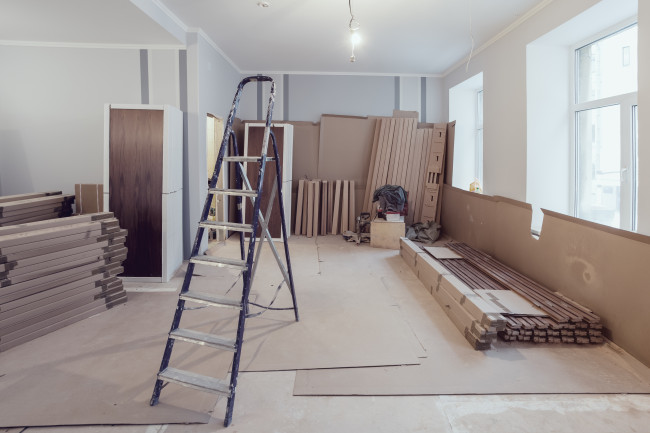After enduring my neighbor’s six-month gut renovation, I have some tips for renovators who want to keep the peace
- Even if your building requires 10-days’ advance notice, consider giving a month or two if possible
- Send a head’s up to your neighbors when work is expected to create excessive noise or fumes
- Communicate when work has run into some delays and some downtime is expected
As an Upper West Side co-op owner, I’ve lived through gas and water shutdowns, a plaster avalanche from a leak in my upstairs neighbor’s bathroom, and waking up to strange men on hoists outside my bedroom window.
But nothing prepared me for my new downstairs neighbor’s gut renovation: Walls were torn down, tubs and closets were torn out, interior plumbing and kitchen appliances were replaced. Track lighting was drilled into the ceiling, which is my floor. While all of this work was being done on her newly purchased apartment, my neighbor remained tucked peacefully in her old apartment.
[Editor's Note: Brick Underground's Inside Stories features first-person accounts of dramatic, real-life New York City real estate experiences. Have a story to share? Drop us an email. We respect all requests for anonymity.]
My life under construction
Meanwhile, my life, my work, and my sanity became a total wreck. For nearly six months I lived in daily (and sometimes weekly and monthly) exile from my apartment to escape the thunderous noise. I squatted in homes, hotels and apartments from Georgia to California, and borrowed office space from friends, strangers and even my bank. My gym locker became my base camp. My schedule became an exhausting Rubik’s Cube and my circadian rhythms all but disappeared. I lost eight pounds.
New York City’s Noise Code, also known as Local Law 113, states that “that every person is entitled to ambient noise levels that are not detrimental to life, health and enjoyment of his property.” And according to the CDC, “Continual exposure to noise can cause stress, anxiety, depression, high blood pressure, heart disease, and many other health problems,” including hearing loss.
I talked to Dr. Carol W. Berman, a NYC psychiatrist whose next-door neighbor did a full renovation. She says the real psychological damage comes from a sense of helplessness and lack of control, not knowing when the other shoe, or in this case, the jack hammer, will drop. Your usual habits are thrown into havoc, including when, where, how and even if you eat your meals. Resentment and anger become your primary emotions. All this can mess with your brain chemistry, and you may even find yourself changing at a very fundamental level.
Lessons learned
If surviving this ordeal gives me license to dispense advice, I’ll give it a go. You know what they say about hindsight. I can certainly tell you what my neighbor and I did and didn’t do, and what I wish had been done differently.
Give a reasonable heads up
Even with my building’s required 10-day notice, there was simply not enough time to find an alternate workspace and plan visits to friends and family while still carrying out ongoing responsibilities. Yes, my neighbor was in compliance with this requirement. But she’d bought the place months before and knew she’d be redoing it.
She did slip a cordial letter introducing herself under my door along with the 10-day notice, exactly 10 days before commencing work. She could have introduced herself, ideally in person, long before the required deadline. Two months or so would have given me enough warning to start lining things up. For families with babies, or neighbors who have health issues or are elderly, I would suggest even longer. And boards should consider requiring a longer notice period.
Settle on workable workdays
My building limits loud construction noise to the hours between 8 a.m. and 4 p.m. Even though I started setting my alarm for 4:45 a.m., I didn’t have enough time to get things done by 8 a.m., when I needed to leave for the day. So we agreed to a 9 a.m. start. Still, I found I needed the weekends and the occasional legal holiday for more in-depth at-home chores and work projects. That put relaxation and socializing on the back burner.
I also would have appreciated it if my neighbor (or her contractor) could have let me know when they expected some down time because they had run into a delay.
Manage expectations
To make up for lost time, the contractor brought in a big crew. That meant they could work in every part of the apartment simultaneously, so hiding out in one room while the other was under siege was not an option. If there were quiet times during the course of a day, I wouldn’t have known, as I was already on the run by 9 a.m.
A more detailed project plan and regular updates could have given me opportunities to be more in control of my schedule and be in my own space.
Send updates
The renovation process is dynamic, and the best laid plans are subject to change. A couple of times, my neighbor sent me emails ahead of especially noisy projects, providing estimated timeframes and locations.
On some days I came home to noxious odors that had wafted up to my apartment. I could have used a heads up on those as well.
Provide contact information
My neighbor gave me her contractor’s phone number, so I could address any issues directly with him. I never took advantage of this (trying to be neighborly myself).
In retrospect, I should have reached out to the foreman with questions about timing and related noise.
Offer assistance
Gifts like noise canceling headphones and white noise machines could make time at home more bearable. Restaurant and takeout gift certificates might help defray the costs of not being able to eat at home. To her credit, my neighbor offered to let me work in her apartment, but only during the late afternoons. But that was precisely the time I could finally go home and tackle my mounting piles of papers and laundry. Perhaps some help paying for co-working space would have made my office search easier and more affordable.
What could she have done differently? Inquire about pain points early on and work out a mutual solution. And make it a line item. Co-op renovations are expensive—often into six figures. But there’s probably room in the budget to help make your neighbor’s life more sane.
Ask questions, don't assume
I recently ran into my neighbor on the bus and helped her carry a bunch of household items into the elevator. I inferred that the work was finally complete, she was moving in, and my life would return to normal. The next morning the banging resumed.
The moral of the story? Don’t assume. Ask and answer. And do it early and often.
Pam Berns is a freelance writer in New York City.
You Might Also Like



























